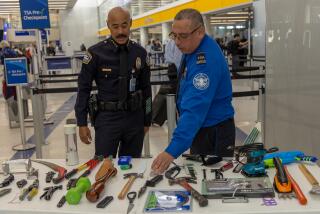Alaska legislator’s ‘no’ to TSA pat-down wins praise at home
When Alaska state Rep. Sharon Cissna passed through airport security a few months ago, the false breast she has worn since her mastectomy set off an alert on the new full-body scanner and triggered what she called a “humiliating” pat-down search.
Last week, it happened again. The Anchorage Democrat was leaving Seattle to return to the legislative session in Juneau when her prosthetic breast sent her once again toward the rubber gloves.
“The horror began again,” she recalled, except this time, she refused.
Cissna caught a small plane to British Columbia and boarded a ferry for a two-day journey back to Juneau.
She arrived in the Alaskan capital Thursday to expressions of support from fellow members of the Alaska Legislature, which passed a resolution backing Cissna’s stand that declared “no one should have to sacrifice their dignity in order to travel.”
Alaskans — residents of a state with so few roads that most journeys must be taken by boat or plane — say they do not enjoy the same ability as other Americans to refuse security measures imposed by the Transportation Security Administration.
“We can’t take Amtrak, we can’t take Greyhound, we can’t drive ourselves. Those options aren’t open to us. We have a choice of fly or stay home,” said Republican State Rep. Alan Dick, who spoke on the House floor about Cissna’s case before overwhelming approval of a resolution in support of her.
TSA officials say there is nothing inherent in a mastectomy that should set off alarms in airport screening devices and that Cissna should theoretically have received the same treatment as millions of other travelers subjected to the new “enhanced” pat-down procedures that took effect at U.S. airports last fall.
“Anomalies that we can see would [trigger an] alarm, and those anomalies would have to be resolved,” said Dwayne Baird, a TSA spokesman.
The American Civil Liberties Union said it has received more than 1,000 complaints from passengers who feel they have received inappropriate pat-downs under the new screening procedures, which require a thorough search whenever the full-body scanning equipment finds something unusual.
“Many people have felt genuinely traumatized,” said Jay Stanley, senior policy analyst with the ACLU’s speech, privacy and technology program. “This policy puts TSA agents into intimate contact with Americans’ bodies in a way that normally only doctors are in a position to do.”
Cissna said she was not overly sensitive about her mastectomy and never bothered to have breast reconstruction surgery. “I’m not affected in a negative way by my breast cancer now. In fact, I look at it as a more positive experience in a way. It reminds me every day that I’m alive because I had that body part removed that would have killed me,” she said.
Yet she is acutely sensitive to being aggressively touched in private areas because of a traumatic touching experience she underwent as a child, she said.
“It was a very inappropriate touch, when I was a young child. That’s been with me all my life, but I had been able to remove it from something I ever think about — until that day at the airport. And it upset me, to the point where I was feeling traumatized for several weeks.”
Stanley said the website on which the ACLU is collecting complaints received several reports from women who had had mastectomies and people of both genders who’d had surgery of some kind that apparently triggered an anomaly in the screening equipment.
“Many of the people who filed complaints reported that the searches were extremely intrusive, that their genital areas were being patted through their clothing, sometimes repeatedly, agents ran fingers several inches down their waistbands, or through their hair in the area around the collar, rubbing their bodies all over,” Stanley said.
Baird said there are “a couple of different layers of pat-downs,” the details of which the agency does not discuss for security reasons. “But the situation is, we have to resolve what’s there, to determine that it’s not a threat item,” he said.
“Our security officers are trained to work with each individual traveler to ensure a respectful screening process, while providing the best possible security for everyone. We are sensitive to travelers’ concerns, but security is not optional,” the agency said in a statement.
Baird said travelers sensitive to searches are entitled to undergo it in a private screening area in the presence of a traveling companion.
U.S. Sen. Lisa Murkowski (R-Alaska) wrote a letter of concern to TSA Administrator John Pistole on Cissna’s behalf. “I am concerned there is an imbalance between safety requirements and overly invasive procedures targeting air travelers who have undergone mastectomy surgeries or use prosthetics,” she wrote.
State Rep. Chris Tuck, another Anchorage Democrat, said Cissna was not facing treatment remarkably different from what many other travelers face. “I appreciate her standing up and not subjecting herself to something she doesn’t believe is decent,” he said.
Cissna said she was approached by several fellow travelers during her ferry journey to Juneau, some of whom shared similar stories. “A woman I met at one of the docks told me about her young son who’d been deeply burned, and he had Band-Aids on, and they were looking under the Band-Aids,” she said.
“I believe in government. I believe we can do things right. But this is out of balance,” Cissna said. “We need to make our airlines, our ferries, every type of transportation safe — but we need to do it in a sane way.”
More to Read
Start your day right
Sign up for Essential California for news, features and recommendations from the L.A. Times and beyond in your inbox six days a week.
You may occasionally receive promotional content from the Los Angeles Times.






